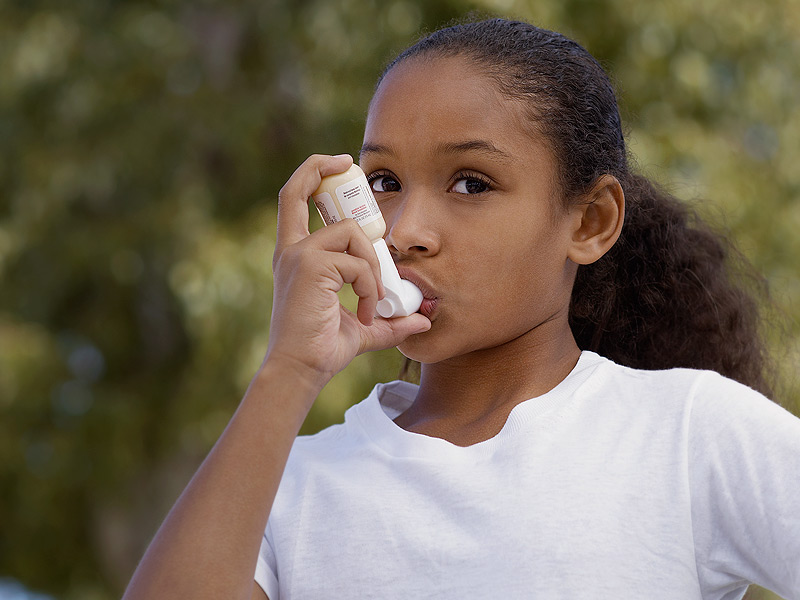 If an individual suffers from allergies, there is a possibility that asthma can complicate the course of treatment of allergies. Asthma is an inflammation of the airway caused by a reaction to irritating substances. Repeated asthma attacks are attributed to the narrowing of the airway.
If an individual suffers from allergies, there is a possibility that asthma can complicate the course of treatment of allergies. Asthma is an inflammation of the airway caused by a reaction to irritating substances. Repeated asthma attacks are attributed to the narrowing of the airway.
Reports indicate there are over 15 million people who have asthma (this number includes children diagnosed with the condition). Asthma is linked to an eczema rash. If eczema begins in infancy, there is a strong chance of the child developing asthma. Eczema can be found in individuals who have an allergy to Vitamin C-citrus products.
Symptoms of asthma include: wheezing. Wheezing is a whistling sound usually heard on expiration. Other symptoms are shortness of breath, chest discomfort and general uneasy feeling that circulates throughout the body.
 An asthma attack can be triggered by exposure to indoor or outdoor allergens, laughing or crying, changes in weather temperature, exercise, sulfite (food preservative), yellow food coloring and second hand smoke.
An asthma attack can be triggered by exposure to indoor or outdoor allergens, laughing or crying, changes in weather temperature, exercise, sulfite (food preservative), yellow food coloring and second hand smoke.
Asthma following exposure to allergens may increase the risk of future asthma attacks. Onset of asthma in children is usually linked to allergies. Adult asthma onset also has been reported with individuals who have been exposed to allergens.
To determine whether an allergy is an important part of diagnosing asthma,there are several types of asthmatic conditions to be considered.
Intermittent asthma is when an individual has minor asthmatic episodes with normal lung function. This condition has been associated with viruses and or change in weather (allergy affected).
Exercised-induced asthma is caused by exposure to inhaled irritants (cold air, pollens, chemicals, dust) while exercising. Most athletes experience airway constriction after exertion.
Nocturnal asthma peaks in the night and early morning hours. Nocturnal asthma causes patients to experience asthmatic episodes usually between the hours of 1:00 to 4:00am. Exposure to allergens-dust mites, animal dander, and fabrics are inhaled and in turn nasal passages and airway to react.
 Environmental or chemical asthma is caused by exposure to unhealthy substances. Molds, chemical solvents, wood, plastics, and bleach exposure trigger asthmatic symptoms.
Environmental or chemical asthma is caused by exposure to unhealthy substances. Molds, chemical solvents, wood, plastics, and bleach exposure trigger asthmatic symptoms.
Foods have been identified to cause asthma. The triggers are alcohol, baking powder, baking soda, caffeine, chocolate, citrus fruits, coffee, corn, cow’s milk, eggplant, grains, onions, peppers, potatoes, seeds, spices, soy and soy products, tomatoes, wheat, gluten and yeast products. When foods have been eliminated from the person’s diet, there is a remarked improvement with allergies. Baker’s asthma is common in bakery or factory workers. Workers wheeze after inhaling the dust from the yeast and flour. This type of asthma does not cause a gluten allergy.
Conditions related to asthma can also be triggered by allergies. Blocked sinuses caused by inhaled allergens can lead to sinus infections. Ear infections (especially in children) can be caused by allergens. Exposure to dust, molds irritate the nose and throat and block the eustachian tube causing middle ear infections. Chronic bronchitis is linked to indoor and outdoor allergens. Chronic Obstructive Pulmonary Disease (COPD) Is caused by irritants(inhaled allergens) to the lungs. COPD is recognized in two forms: emphysema and chronic bronchitis. Both conditions become more severe when allergies exist.
